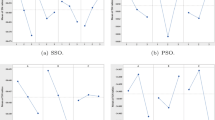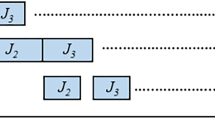Abstract
Lot streaming is the technique of splitting a given job into sublots to allow the overlapping of successive operations in multi-stage manufacturing systems thereby reducing production makespan. Several research articles appeared in literature to solve this problem and most of these studies are limited to pure flowshop environments where there is only a single machine in each stage. On the other hand, because of the applicability of hybrid flowshops in different manufacturing settings, the scheduling of these types of shops is also extensively studied by several authors. However, the issue of lot streaming in hybrid flowshop environment is not well studied. In this paper, we aim to contribute in bridging the gap between the research efforts in flowshop lot streaming and hybrid flowshop scheduling. We propose a mathematical model and a genetic algorithm for the lot streaming problem of several jobs in multi-stage flowshops where at each stage there are unrelated parallel machines. The jobs may skip some of the stages, and therefore, the considered system is a complex generalized flowshop. The proposed genetic algorithm is executed on both sequential and parallel computing platforms. Numerical examples showed that the parallel implementation greatly improved the computational performance of the developed heuristic.
Similar content being viewed by others
References
Baker K (1995) Lot streaming in the two-machine flow shop with setup times. Annal Oper Res 57(1):1–11
Baker KR, Jia D (1993) A comparative study of lot streaming procedures. OMEGA Int J Manag Sci 21(5):561–566
Bertel S, Billaut JC (2004) A genetic algorithm for an industrial multiprocessor flow shop scheduling problem with recirculation. Eur J Oper Res 159(3):651–662
Biskup D, Feldmann M (2006) Lot streaming with variable sublots: an integer programming formulation. J Oper Res Soc 57(3):296–303
Blackburn J (1991) Time-based competition. Business One Irwin, Burr Ridge
Bockerstette J, Shell R (1993) Time based manufacturing. McGraw-Hill, New York
Botta-Genoulaz V (2000) Hybrid flow shop scheduling with precedence constraints and time lags to minimize maximum lateness. Int J Prod Econ 64(1-3):101–111
Bukchin J, Masin M (2004) Multi-objective lot splitting for a single product m-machine flowshop line. IIE Trans 36(2):191–202
Cantú-Paz E (2000) Efficient and accurate parallel genetic algorithms. Kluwer Academic, Norwell
Chang JH, Chiu HN (2005) A comprehensive review of lot streaming. Int J Prod Res 43(8):1515–1536
Chen J, Steiner G (1996) Lot streaming with detached setups in three-machine flow shops. Eur J Oper Res 96(3):591–611
Chiu HN, Chang JH, Lee CH, (2004) Lot streaming models with a limited number of capacitated transporters in multistage batch production systems. Comput Oper Res 31(12):2003–2020
Defersha FM, Chen M, (2007) A parallel genetic algorithm for dynamic cell formation in cellular manufacturing systems. Int J Prod Res. doi:10.1080/00207540701441962
Feldmann M, Biskup D (2008) Lot streaming in a multiple product permutation flow shop with intermingling. Int J Prod Res 46(1):197–216
Glass C, JND G, Potts C (1994) Lot streaming in three-stage process. Eur J Oper Res 75(2):378–394
Hall NG, Laporte G, Selvarajah E, Srikandarajah C (2003) Scheduling and lot streaming in flow shops with no-wait in process. J Sched 6(4):339–354
Janiak A, Kozan E, Lichtenstein M, Oğuzc C (2007) Metaheuristic approaches to the hybrid flow shop scheduling problem with a cost-related criterion. Int J Prod Econ 105(2):407–424
Jungwattanakit J, Reodecha M, Chaovalitwongse P, Werner F (2008) Algorithms for flexible flow shop problems with unrelated parallel machines, setup times, and dual criteria. Int J Adv Manuf Technol 37(3–4):354–370
Kumar S, Bagchi T, Sriskandarajah C (2000) Lot streaming and scheduling heuristics for m-machine no-wait flow shop. Comput Ind Eng 38(1):149–172
Liu SC (2003) A heuristic method for discrete lot streaming with variable sublots in a flow shop. Int J Adv Manuf Technol 22(9–10):662–668
Marimuthu S, Ponnambalam SG, Jawahar AN (2008) Evolutionary algorithms for scheduling m-machine flow shop with lot streaming. Robot Comput-Integr Manuf 24(1):125–139
Martin CH (2009) A hybrid genetic algorithm/mathematical programming approach to the multi-family flowshop scheduling problem with lot streaming. OMEGA Int J Manag Sci 37(1):126–137
Oğuz C, Zinder Y, Do VH, Janiak A, Lichtenstein M (2004) Hybrid flow-shop scheduling problems with multiprocessor task systems. Eur J Oper Res 152(1):115–131
Oǧuz C, Frinket ME (2005) A genetic algorithm for hybrid flow-shop scheduling with multiprocessor tasks. J Sched 8(4):323–351
Potts C, Baker K (1989) Flow shop scheduling with lot streaming. Oper Res Lett 8(6):297–303
Reiter S (1966) A system for managing job shop production. J Bus 39(3):371–393
Ruiz R, Şerifoglub FS, Urlings T (2008) Modeling realistic hybrid flexible flowshop scheduling problems. Comput Oper Res 5(4):1151–1175
Ruiz R, Maroto C (2006) A genetic algorithm for hybrid flowshops with sequence dependent setup times and machine eligibility. Eur J Oper Res 169(3):781–800
Sen A, Topaloglu E, Benli OS (1998) Optimal streaming of a single job in a two-stage flow shop. Eur J Oper Res 110(1):42–62
Sriskandarajah C, Wagneur E (1999) Lot streaming and scheduling multiple products in two-machine no-wait flow shop. IIE Trans 31(8):695–707
Tang L, Liu W, Liu J (2005) A neural network model and algorithm for the hybrid flow shop scheduling problem in a dynamic environment. J Intell Manuf 16(3):361–370
Tang L, Xuan H, Liu J (2006) A new lagrangian relaxation algorithm for hybrid flowshop scheduling to minimize total weighted completion time. Comput Oper Res 33:(11) 3344–3359
Trietsch D, Baker K (1993) Basic techniques for lot streaming. Oper Res 41:(6) 1065–1076
Tseng CT, Liao CJ (2008) A discrete particle swarm optimization for lot-streaming flowshop scheduling problem. Eur J Oper Res. 199:(2) 360–373
Vickson RG, Alfredsson BE (1992) Two and three machines flow shop scheduling problems with equal sized transfer batches. Int J Prod Res 30(7):1551–1574
Xiao W, Hao P, Zhang S, Xu X (2000) Hybrid flow shop scheduling using genetic algorithms. Proceeding of the 3rd World Congress on Intelligent Control and Automation. Hefei, P.R. China pp 537–541
Ying K-C, Lin S-W (2006) Multiprocessor task scheduling in multistage hybrid flow-shops: an ant colony system approach. Int J Prod Res 44(16):3161–3177
Zandieh M, Fatemi Ghomi SMT, Moattar Husseini SM (2006) An immune algorithm approach to hybrid flow shops scheduling with sequence-dependent setup times. Appl Math Comput 180(1):111–127
Zhang W, Yin C, Liu J, Linn RJ (2005) Multi-job lot streaming to minimize the mean completion time in m-1 hybrid flowshops. Int J Prod Econ. 96(2):189–200
Author information
Authors and Affiliations
Corresponding author
Rights and permissions
About this article
Cite this article
Defersha, F.M., Chen, M. Mathematical model and parallel genetic algorithm for hybrid flexible flowshop lot streaming problem. Int J Adv Manuf Technol 62, 249–265 (2012). https://doi.org/10.1007/s00170-011-3798-0
Received:
Accepted:
Published:
Issue Date:
DOI: https://doi.org/10.1007/s00170-011-3798-0




